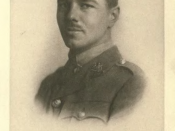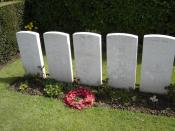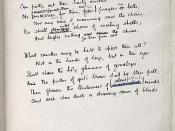Wilfred Owens' poetry on war can be described as a passionate expression of Owen's outrage over the horrors of war and pity for the young soldiers sacrificed in it. His poetry is dramatic and memorable, whether describing shame and sorrow, such as in 'The Last Laugh', or his description of the unseen psychological consequences of war detailed in 'The Next War' and 'Anthem for Doomed Youth'. His diverse use of instantly understandable technique is what makes him the most memorable of the war poets. His poetry evokes more than simple disgust and sympathy from the reader; issues previously unconsidered are brought to our attention.
The conscription of young men to battle during WWI was typically celebrated. Committed soldiers were glorified as heroes of the national cause. In Britain, churchmen justified such human sacrifice in the name of war, by claiming God was on Britain's side. Religious services and anthems were sung, praising the patriotic departure of troops even though it culminated in great human loss.
Owen's poem, 'Anthem for Doomed Youth', criticises Britain's actions and their ignorant exaltation of them. Owen ironically undermines the concept of an anthem by emphasising that there is nothing to celebrate but 'Doomed Youth'. This refers to the young men having their lives brutally cut short. Owen establishes the theme of his sonnet with the rhetorical question "What passing-bells for these who die as cattle?" This refers to the inhumane slaughter of soldiers, shifting the audience's vision of an honourable and pride-worthy death to the unprecedented and shameful mass killings of the Great War. Throughout the poem, Owen juxtaposes the musical quality of an anthem with the harsh sounds of war. This concept is first raised at the end of the first quatrain with the noisy onomatopoeia of the "rifles'...


